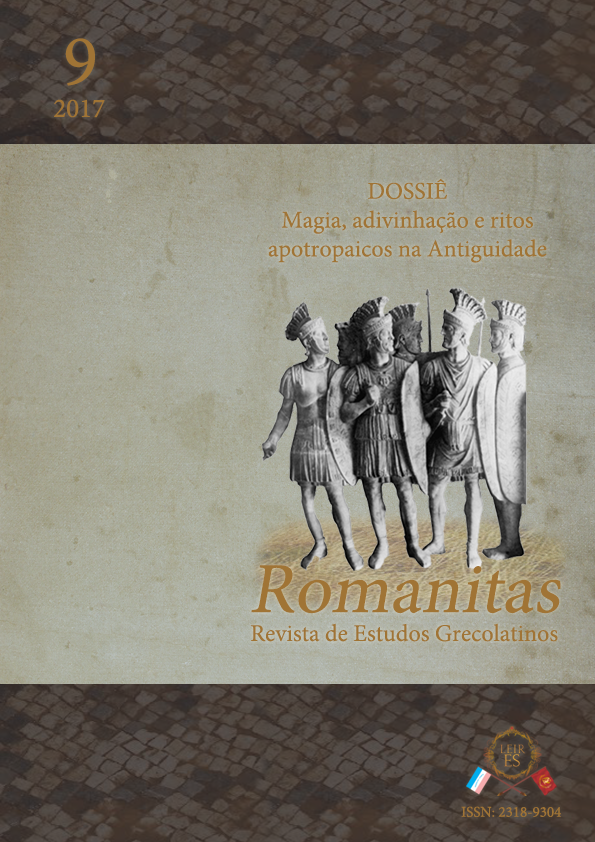Writing culture and oral communication in ancient Christianity: the homilies as instruments of power
DOI:
https://doi.org/10.17648/rom.v0i9.18488Keywords:
Roman Empire, Christianity, Writing culture, Oral communication, HomiliesAbstract
A creed risen in a Jewish environment, Christianity was organized in terms of a textual community that attributed to the written culture a major role in the preservation and transmission of the precepts announced by Jesus. Owe to it, the evangelion, kept initially by means of the oral tradition, was finally written, according to a non-stop movement of “bureaucratization” of the Christian belief. Indeed, the holy message bore by the Christian texts, coupled with the emergence of a complex ecclesiastic hierarchy, was decisive for the consolidation of the Church. Therefore, Christianity represents a remarkable example of a steady association between power and writing. Nevertheless, we should recall that the Christian emphasis on writing, in Antiquity, did not imply the abandon of the oral tradition, since the homilies, a flourishing literary genre in the fourth and fifth centuries A.D., experienced a noticeable development under the influence of the classical rhetoric.
Downloads
References
Documentação textual
EUSÉBIO DE CESARÉIA. História Eclesiástica. São Paulo: Paulus, 2000.
JUSTINO DE ROMA. I e II Apologias. Diálogo com Trifão. São Paulo: Paulus, 1995.
Obras de apoio
BERARDINO, A. Dicionário patrístico e de Antigüidades Cristãs. São Paulo: Paulus, 2002.
CAMERON, A. Christianity and the rhetoric of Empire. Berkeley: University of California Press, 1994.
______. Education and literary culture. In: CAMERON, A.; GARNSEY, P. (Ed.). The Cambridge Ancient History. Cambridge: Cambridge University Press, 2008, p. 665-707. v. XIII.
CASTAGNO, A. M. Origen the scholar and pastor. In: CUNNINGHAM, M. B.; ALLEN, P. (Ed.). Preacher and audience: studies in Early Christian and Byzantine homiletics. Leiden: Brill, 1998, p. 65-87.
CAVALLO, G.; CHARTIER, R. História da leitura no mundo ocidental. São Paulo: Ática, 2002. v. 1.
CUNNINGHAM, M. B.; ALLEN, P. Introduction. In: CUNNINGHAM, M. B.; ALLEN, P. (Ed.). Preacher and audience: studies in Early Christian and Byzantine homiletics. Leiden: Brill, 1998, p. 1-20.
FLAMANT, J.; MONFRIN, F. Une culture “si ancienne et si nouvelle”. In: MAYEUR, J. M. et al. (Org.). Histoire du Christianisme: naissance d’une Chrétienté (250-430). Paris: Desclée, 1995, p. 623-673. v. 2.
GAMBLE, H. Y. Books and readers in the Early Christian Church. New Haven: Yale University Press, 1995.
HARTNEY, A. M. John Chrysostom and the transformation of the city. London: Duckworth, 2004.
HUBBEL, H. M. Chrysostom and rhetoric. Classical Philology, n. 19, p. 261-276, 1924.
KONINGS, J. A Bíblia nas suas origens e hoje. Petrópolis: Vozes, 1997.
LANE FOX, R. Cultura escrita e poder nos primórdios do cristianismo. In: BOWMAN, A. K.; WOOLF, G. (Org.). Cultura escrita e poder no Mundo Antigo. São Paulo: Ática, 1998. p. 154-182.
LIÉBAERT, J. Os padres da Igreja: séculos I-IV. São Paulo: Loyola, 2000. v. 1.
MARROU, H. I. Décadence romaine ou Antiquité Tardive? (IIIe-IVe siècle). Paris: Seuil, 1977.
______. História da Educação na Antiguidade. São Paulo: E. P. U., 1990.
MARKUS, R. A. Social and historical setting. In: YOUNG, F.; AYRES, L.; LOUTH, A. (Ed.). The Cambridge history of Christian literature. Cambridge: Cambridge University Press, 2008, p. 399-413.
MAXWELL, J. L. Christianization and communication in Late Antiquity: John Chrysostom and his congregation in Antioch. Cambridge: Cambridge University Press, 2006.
MAYER, W. John Chrysostom and his audiences: distinguishing different congregations at Antioch and Constantinople. Studia Patristica, v. XXXIII, p. 70-75, 1997.
______. John Chrysostom: extraordinary preacher, ordinary audience. In: CUNNINGHAM, M. B.; ALLEN, P. (Ed.). Preacher and audience: studies in Early Christian and Byzantine homiletics. Leiden: Brill, 1998, p. 105-137.
MORESCHINI, C.; NORELLI, E. História da literatura cristã antiga grega e latina: do Concílio de Nicéia ao início da Idade Média. São Paulo: Loyola, 2000. t. I.
NEIL, B. Towards defining a Christian culture: the Christian transformation of classical literature. In: CASIDAY, A.; NORRIS, F. W. (Ed.). The Cambridge history of Christianity: Constantine to c. 600. Cambridge: Cambridge University Press, 2008, p. 317-342.
OLIVAR, A. Reflections on problems raised by early Christian preaching. In: CUNNINGHAM, M. B.; ALLEN, P. (Ed.). Preacher and audience: studies in Early Christian and Byzantine homiletics. Leiden: Brill, 1998, p. 21-32.
QUASTEN, J. La edad de oro de la literatura patrística griega. Madrid: B.A.C., 1994.
REBOUL, O. Introdução à retórica. São Paulo: Martins Fontes, 2004.
SAXER, V. La mission: l’organisation de l’Église au IIIe. siècle. In: MAYEUR, J. M. et al. (Org.). Histoire du Christianisme: naissance d’une Chrétienté (250-430). Paris: Desclée, 1995, p. 41-75. v. 2.
SCHWARTZ, S. Imperialism and Jewish society, 200 B.C.E. to 640 C.E. Princeton: Princeton University Press, 2004.
SKARSAUNE, O.; HVALVIK, R. (Ed.). Jewish believers in Jesus: the early centuries. Peabody: Hendrickson, 2007.
STEWART-SYKES, A. Hermas the Prophet and Hippolytus the Preacher: the Roman homily and its social context. In: CUNNINGHAM, M. B.; ALLEN, P. (Ed.). Preacher and audience: studies in Early Christian and Byzantine homiletics. Leiden: Brill, 1998, p. 33-63.
WILKEN, R. L. John Chrysostom and the Jews. Eugene: Wipf & Stock, 1983.
YOUNG, F.; AYRES, L.; LOUTH, A. (Ed.). The Cambridge history of Christian literature. Cambridge: Cambridge University Press, 2008, p. 5-10; 251-258; 485-494.
Downloads
Published
How to Cite
Issue
Section
License
Copyright (c) 2017 Romanitas - Revista de Estudos Grecolatinos

This work is licensed under a Creative Commons Attribution-NonCommercial-NoDerivatives 4.0 International License.
a. The authors retain copyright and grant the journal the right to first publication.
b. The authors are authorized to assume additional contracts separately, for non-exclusive distribution of the version of the work published in this journal (e.g., publishing in institutional repository or as a book chapter), with acknowledgment of authorship and initial publication in this journal.
c. Authors are allowed and encouraged to publish and distribute their work online (e.g. in institutional repositories or on their personal page) after the first publication by the journal, with due credit.
d. The journal's texts are licensed under a CC BY 4.0 Deed Attribution 4.0 International Licence (CC BY).




























